Installation & IDE Setup
The standard method of installing Mill is to install a ./mill bootstrap script,
similar to ./gradlew or ./mvnw in other build tools.
This script can determine the best version to be used by a project (e.g. by
reading a .mill-version) and will use this exact Mill version.
If the determined Mill version is not installed locally, it will be downloaded automatically.
For all the examples in this documentation, there is a download link that provides
a zip file containing the full example ready to use. These examples come with a ./mill
script you can use to immediately begin working with the project, needing only a JVM installed
globally.
Bootstrap Scripts
The Mill example projects in this documentation come with ./mill and ./mill.bat
bootstrap script, included. You can also download the boostrap script manually:
> curl -L https://repo1.maven.org/maven2/com/lihaoyi/mill-dist/0.12.17/mill-dist-0.12.17-mill.sh -o mill
> chmod +x mill
> echo 0.12.17 > .mill-version> curl -L https://repo1.maven.org/maven2/com/lihaoyi/mill-dist/0.12.17/mill-dist-0.12.17-mill.bat -o mill.bat
> echo 0.12.17> .mill-version|
Don’t use PowerShell 5.1 to install Mill!
|
Downloading a mill bootstrap script to the root of your project repository makes it easier for
new contributors to build your project, as they don’t have to install Mill before they can start.
Anyone who wants to work with the project can simply use the ./mill script directly.
> ./mill --version
> ./mill __.compile # double underscoreIn general, bootstrap scripts are the recommended way of installing Mill.
Similar to ./gradlew or ./mvnw, the ./mill bootstrap script
reduces the chance of errors due to the installed version of Mill
being incompatible with the version expected by your build.
In-project bootstrap scripts are also useful for running Mill in CI/CD, ensuring
that your build server like Jenkins or Github Actions has the correct version of Mill
present to build, compile or test your code.
If you are starting a new project using a Mill bootstrap script, you can use the mill init to initialize the project folder with one of the Mill example projects. There are a wide range of example projects, from hello-world to multi-module libraries to client-server web applications, and you can pick one most similar to what you are doing so you can hit the ground running working.
Mill Native Executable
The default Mill executable configured above requires a JVM (11 or above) installed globally in
order to run, and imposes some Java startup overhead (100-200ms) when running Mill from the
command line. You can also use Mill’s native executables by appending a -native suffix to the
Mill version:
echo 0.12.17-native > .mill-versionUsing the -native suffix should provide a faster CLI experience than using Mill’s default
JVM launcher, and makes it easier to install Mill in environments without a JVM pre-installed.
Mill native executables are supported on the following OS/CPU combinations:
Windows |
Mac |
Linux |
|
Intel |
Y |
Y |
Y |
ARM |
Y |
Y |
Notably, Mill native executables do not support Windows-ARM, due to limitations in the upstream Graal Native Image tooling (see oracle/graal#9215). If you are on a platform not supported by Mill’s native executables, use the default JVM launcher instead.
Customizing Mill’s JVM
Mill allows you to specify the exact JVM version you want to use to run the build tool
via a .mill-jvm-version file such as:
echo temurin:17.0.6 > .mill-jvm-versionThis has two benefits
-
.mill-jvm-versioncan also be used with Mill’s default JVM launcher if you want your Mill process to use a different JVM than what you have installed globally. This can help ensure your project uses a consistent JVM version and behaves identically regardless of what the developer may have installed on their laptop or dev environment -
.mill-jvm-versioncan be used together with Mill Native Executables to build your project without needing a JVM pre-installed at all. This simplifies project setup and onboarding of new developers.
IDE Support
Mill supports IntelliJ and VSCode and in general any client of the standard Build Server Protocol (BSP).
Your IDEs may already auto-detect the Mill project and run this command on behalf of you, when opening/importing the project.
IntelliJ
To use Mill with IntelliJ, first ensure you have the free IntelliJ Scala Plugin installed. This is necessary as Mill build files are written in Scala, even if you are using it to build a Java or Kotlin or Python project.
Once you have the plugin installed, you can use IntelliJ to open any project
containing a Mill build.mill file, and IntelliJ will automatically load the
Mill build. If you have multiple build systems installed, Intellij may give you
choice which build system configuration to use for the import, which case select BSP:
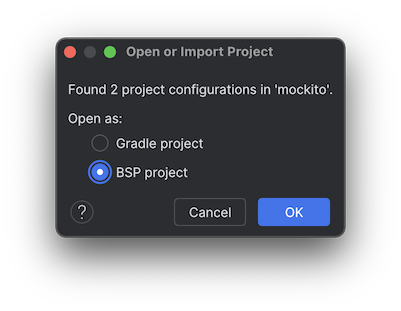
This will provide support both for your application code,
as well as the code in the build.mill:
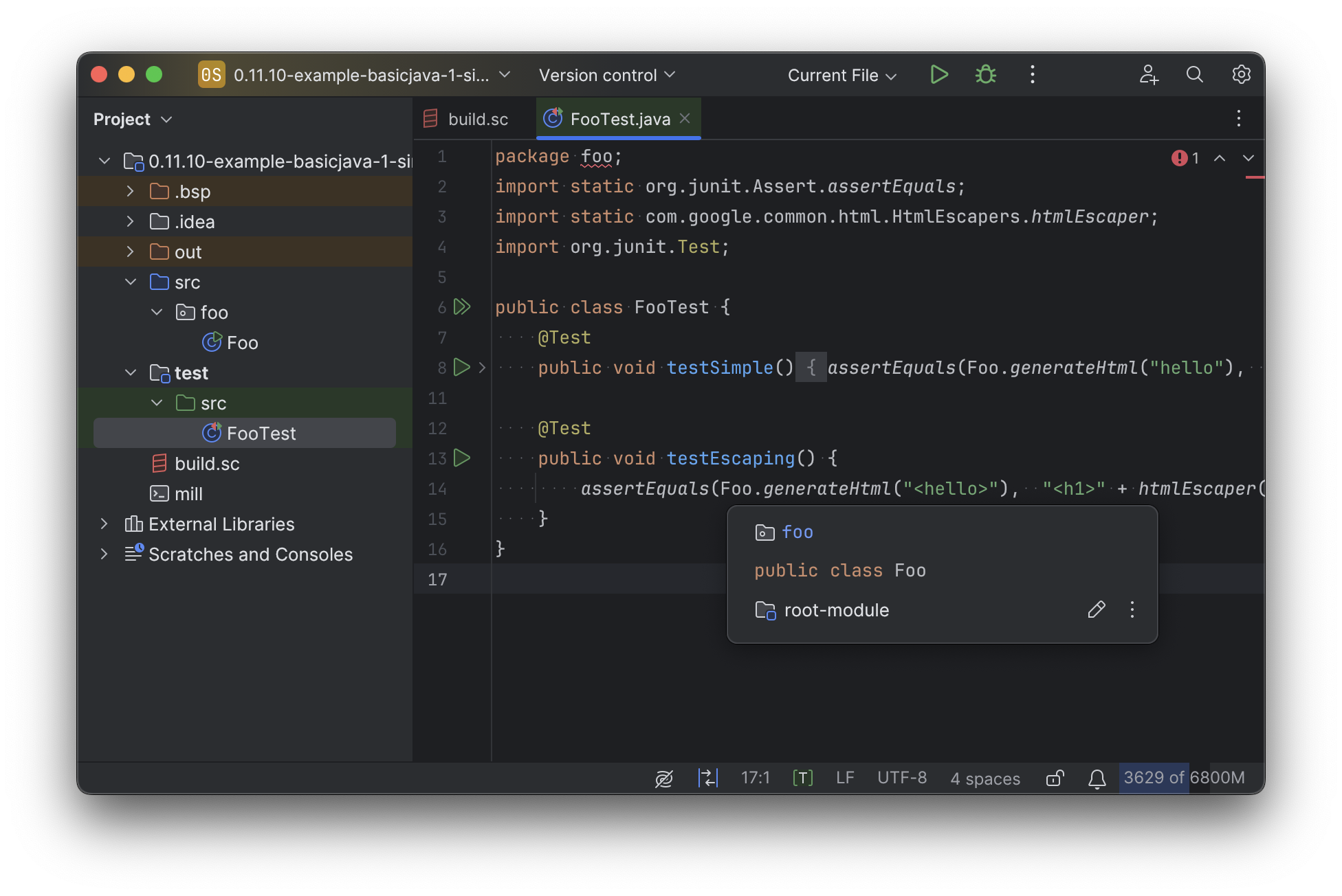
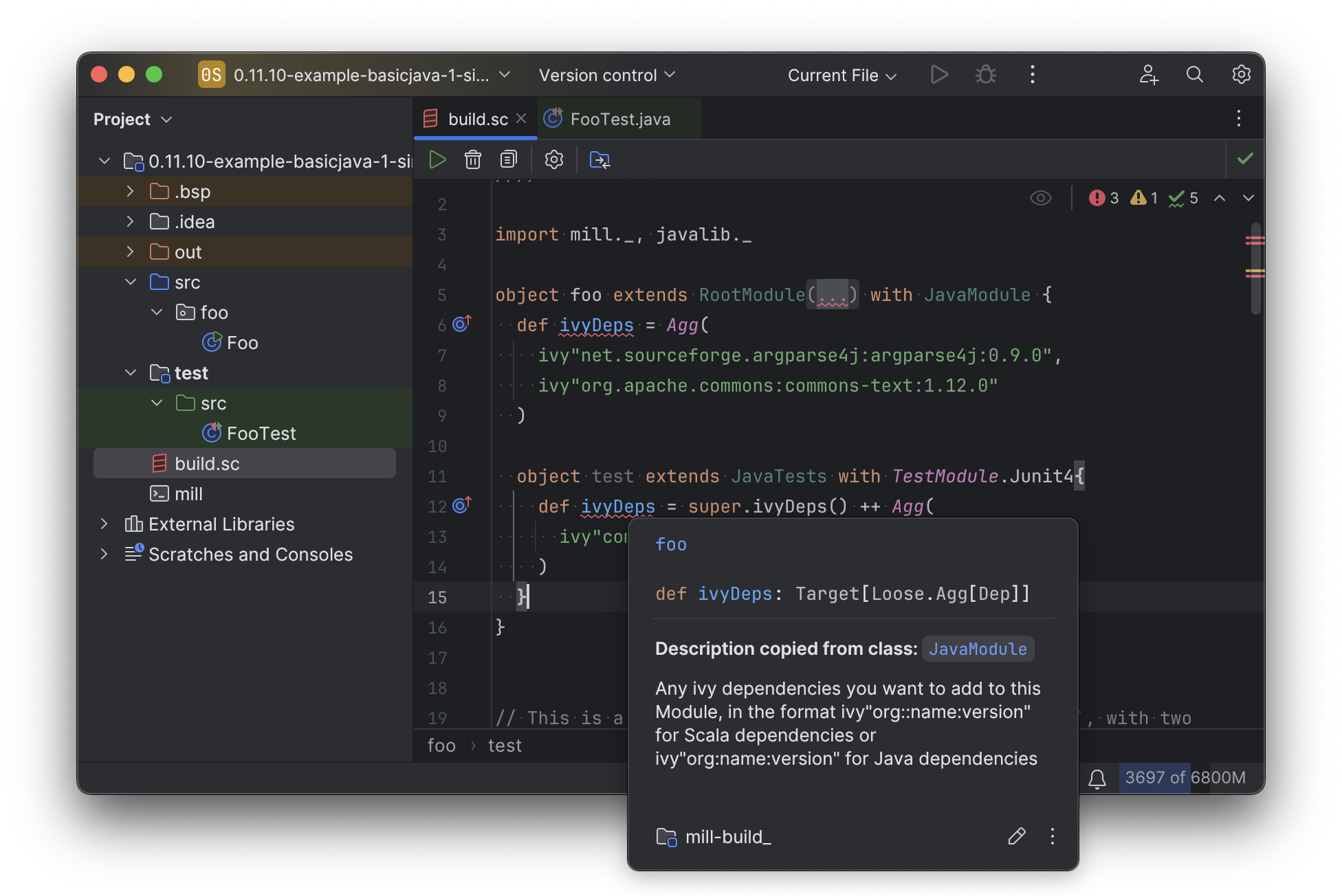
If IntelliJ does not highlight the .mill files correctly, you can explicitly enable
it by adding *.mill to the Scala file type:
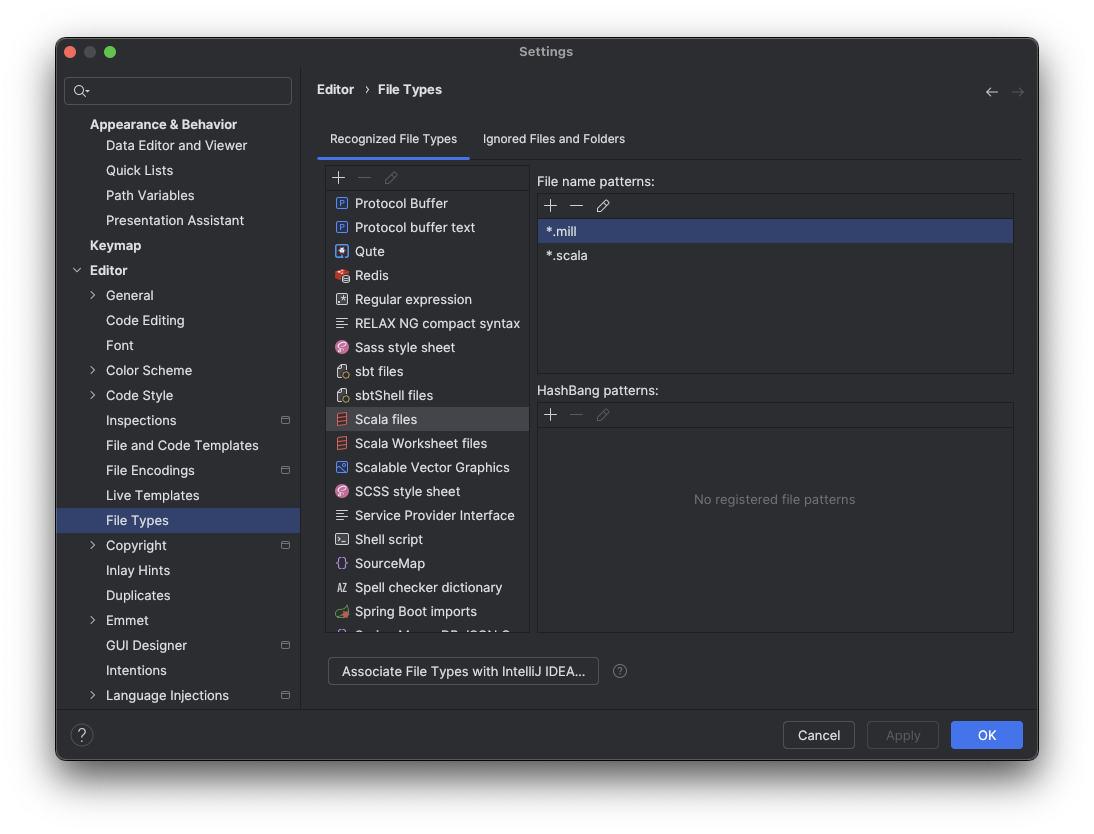
If you make changes to your Mill build.mill, you can ask Intellij to load
those updates by opening the "BSP" tab and clicking the "Refresh" button
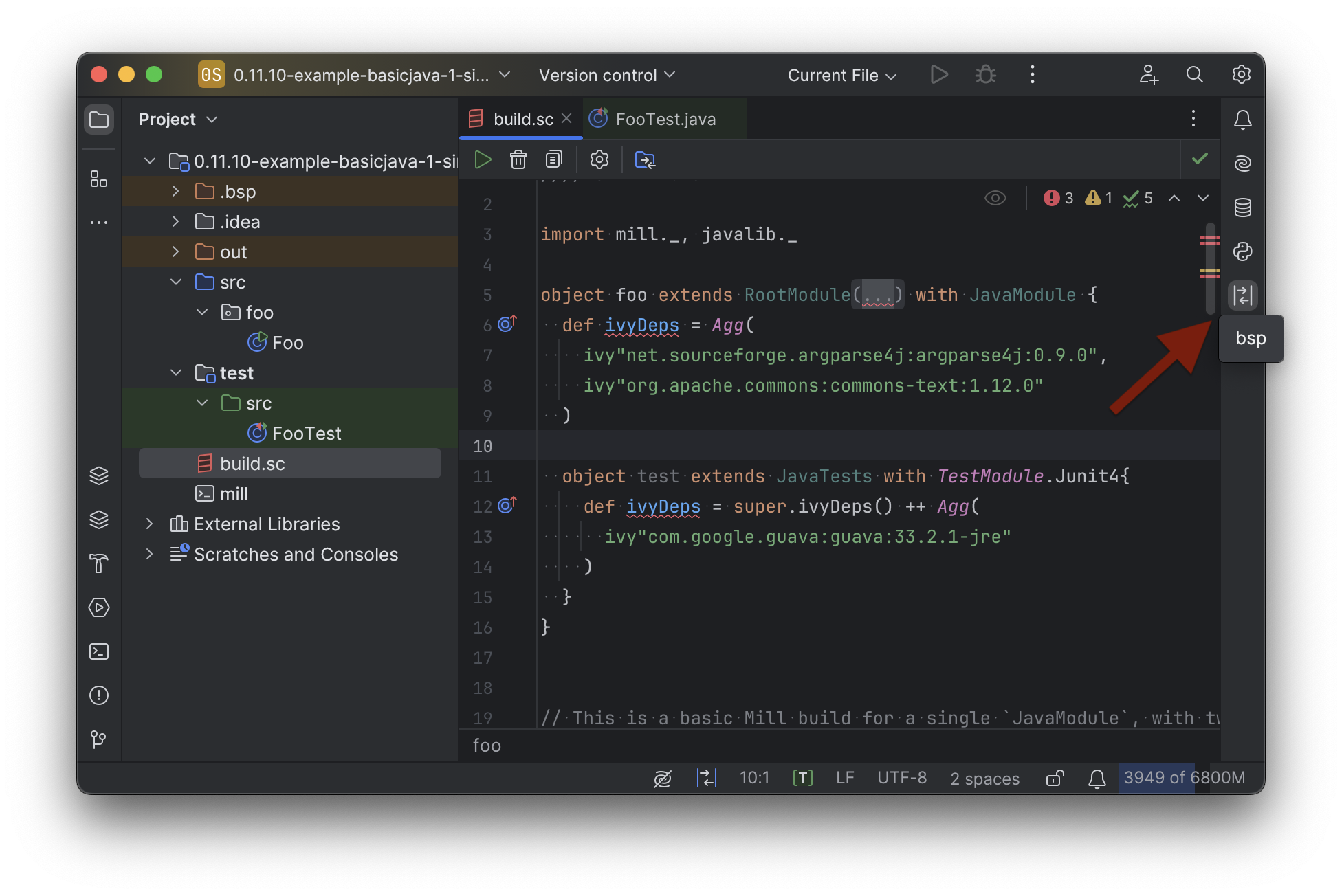
To prepare your project for IDEs, and in general any BSP client, you can also run this command to generate the BSP configuration files:
./mill mill.bsp/installIntelliJ IDEA XML Support
Apart from using the Build Server Protocol, you can also generate IDEA project files directly with Mill. This is probably the preferred way if you work on polyglot projects and need support for frameworks like AspectJ, which are currently not specifically configured over BSP.
To generate IntelliJ IDEA project files into .idea/, run:
./mill mill.idea/This will generate the XML files IntelliJ uses to configure your project
.idea
.idea/scala_settings.xml
.idea/mill_modules
.idea/mill_modules/.iml
.idea/mill_modules/mill-build.iml
.idea/mill_modules/test.iml
.idea/libraries
.idea/libraries/mill_scalalib_2_13_0_11_10_jar.xml
...
.idea/workspace.xml
.idea/modules.xml
.idea/scala_compiler.xml
.idea/misc.xmlAfter the files are generated, you can open the folder in IntelliJ to load the project
into your IDE. If you make changes to your Mill build.mill, you can update the project config
those updates by running ./mill mill.idea/ again.
VSCode
To use Mill with VSCode, first ensure you have the free Metals VSCode Scala language server installed. This is necessary as Mill build files are written in Scala, even if you are using it to build a Java project.
| Mill in VSCode only supports Java and Scala. Kotlin users are advised to use the free IntelliJ IDEA Community Edition |
Once you have the language server installed, you can ask VSCode to open any folder
containing a Mill build.mill file, and VSCode will ask you to import your
Mill build. This will provide support both for your application code,
as well as the code in the build.mill:
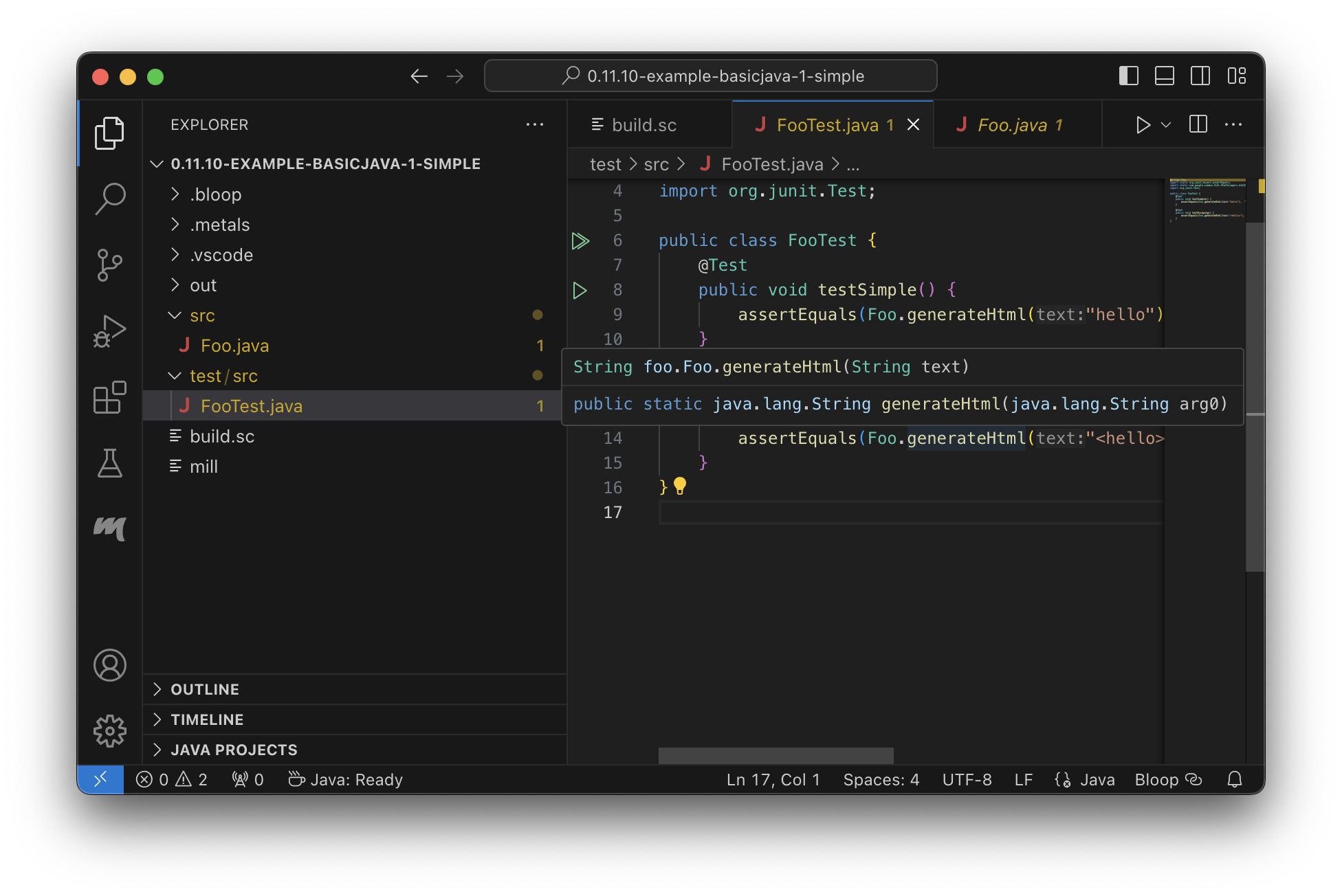
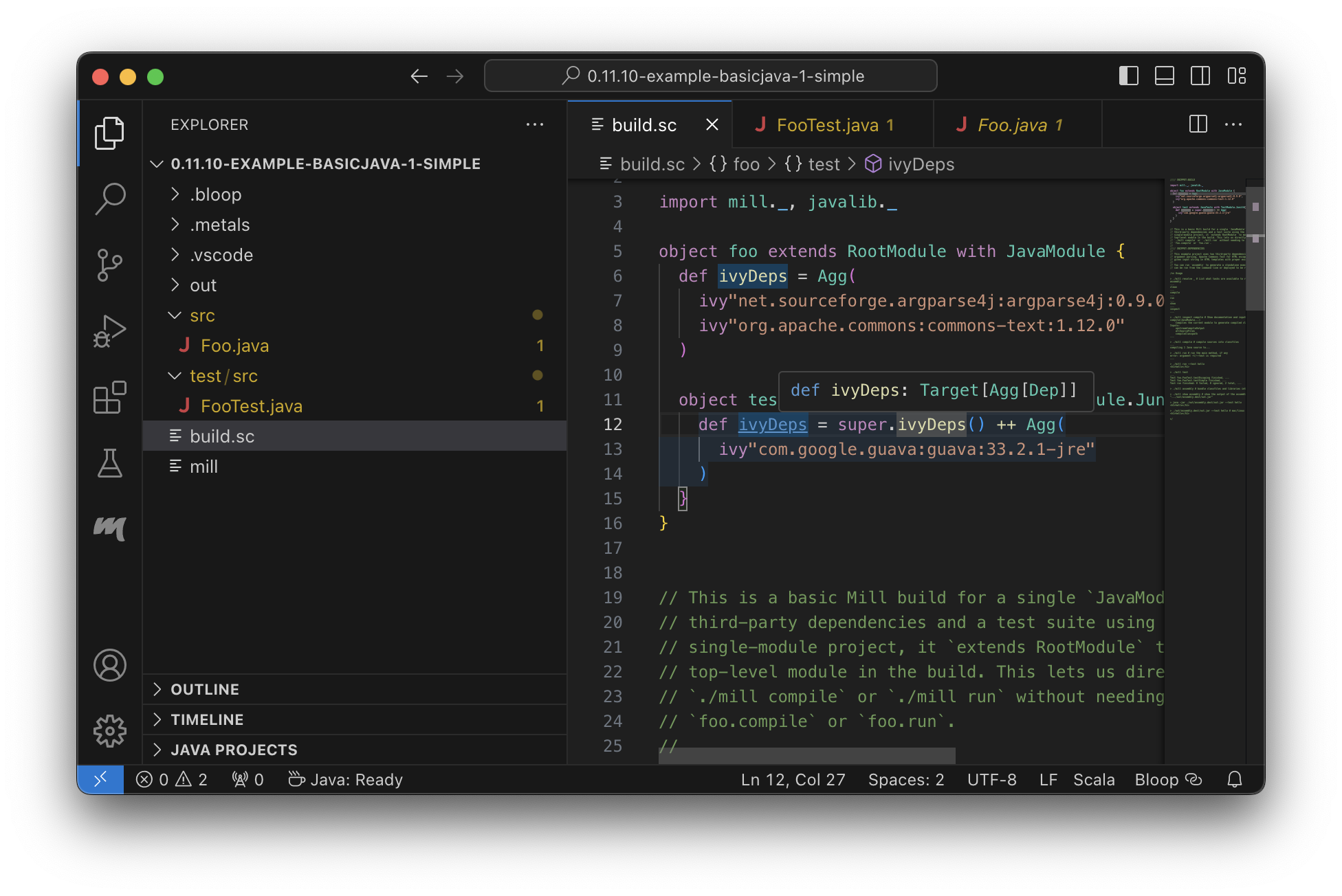
If you make changes to your Mill build.mill, you can ask VSCode to load
those updates by opening the "BSP" tab and clicking the "Refresh" button
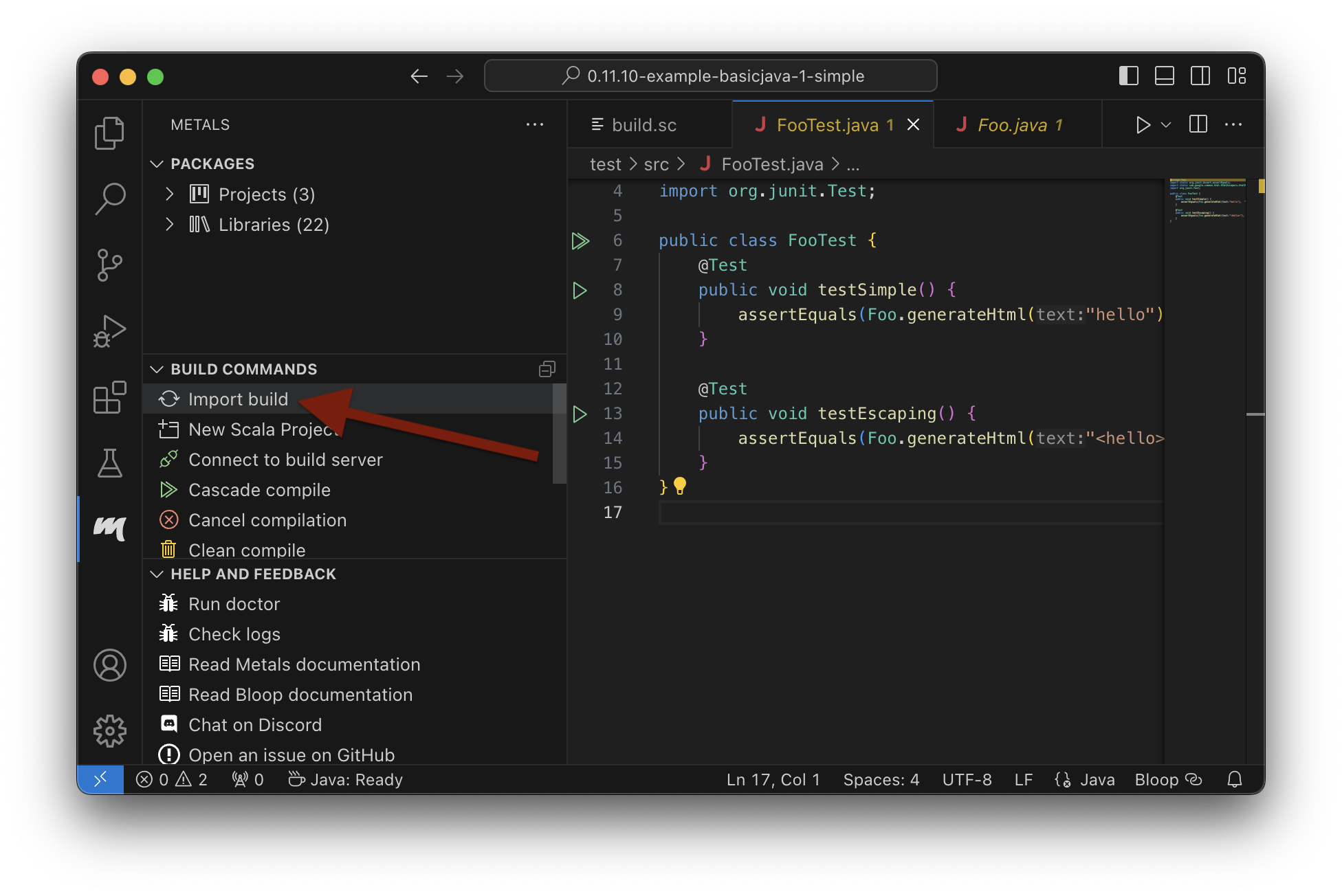
Other Editors / Metals
A lot of other editors may work too, since Metals, the Language Server for Scala has built-in support for BSP. See the general instructions above.
Debugging IDE issues
Mill’s BSP IDE integration writes to a log file under
.bsp/mill-bsp.stderr, where you can find various information about what’s
going on. It contains regular Mill output accompanied by additional BSP
client-server communication details. This can be useful to look at if your
IDE fails to import your Mill project
Updating Mill
Typically, most Mill projects use a .mill-version file to configure what version
to use. You can update the version specified in this file in order to change the version
of Mill. The file path .config/mill-version is also supported. If neither is provided,
the ./mill bootstrap script will use the DEFAULT_MILL_VERSION it has built in.
To choose a different Mill version on an ad-hoc basis, e.g. for experimentation, you can pass
in a MILL_VERSION environment variable, e.g.
MILL_VERSION=0.5.0-3-4faefb mill __.compileor
MILL_VERSION=0.5.0-3-4faefb ./mill __.compileto override the Mill version manually. This takes precedence over the version
specified in ./mill, .config/mill-version or .mill-version
Using Mill without access to Maven Central
Under some circumstances (e.g. corporate firewalls), you may not have access maven central. The typical symptom will be error messages which look like this;
1 tasks failed
mill.scalalib.ZincWorkerModule.classpath
Resolution failed for 1 modules:
--------------------------------------------
com.lihaoyi:mill-scalalib-worker_2.13:0.11.1
not found: C:\Users\partens\.ivy2\local\com.lihaoyi\mill-scalalib-worker_2.13\0.11.1\ivys\ivy.xml
download error: Caught java.io.IOException (Server returned HTTP response code: 503 for URL: https://repo1.maven.org/maven2/com/lihaoyi/mill-scalalib-worker_2.13/0.11.1/mill-scalalib-worker_2.13-0.11.1.pom) while downloading https://repo1.maven.org/maven2/com/lihaoyi/mill-scalalib-worker_2.13/0.11.1/mill-scalalib-worker_2.13-0.11.1.pom
It is expected that basic commands (e.g. clean) will not work, as Mill saying it is unable to resolve it’s own, fundamental, dependencies from the default Maven Central JVM package repository. Under such circumstances, you will normally have access to some proxy, or other corporate repository which resolves maven artifacts. The strategy is simply to tell mill to use that instead.
To resolve this, you can set an environment variable COURSIER_REPOSITORIES (see coursier docs)
to point at your own server that mirrors the Maven Central artifacts.
The below command should pass the environment variable to the mill command.
COURSIER_REPOSITORIES=https://packages.corp.com/artifactory/maven/ mill resolve _
If you are using bootstrap script, a more permanent solution could be to set the environment variable at the top of the bootstrap script, or as a user environment variable.
Automatic Mill updates
If your project is hosted on GitHub, GitLab, or Bitbucket, you can use
Scala Steward to
automatically open a pull request to update your Mill version (in
.mill-version or .config/mill-version file), whenever there is a newer version available.
| Scala Steward can also scan your project dependencies and keep them up-to-date. |
Unstable Development Releases
In case you want to try out the latest features and improvements that are currently in the main branch, unstable versions of Mill are available as versions named:
-
{stable-version}-{commits-since-stable-version}-{commit-hash}
For example, 0.12.5-193-b4d975 is an unstable release after 0.12.5, with 193
additional commits, on commit hash b4d975.
The list of unstable releases can be seen on Maven Central:
Or find the latest unstable version here:
You can update your .mill-version to to the unstable version and the bootstrap script
will download it for you to try it out in your project.
Other installation methods
| The installation methods listed below are maintained outside of Mill and may not have the same features as the bootstrap scripts. You can try using them, but the officially supported way to use Mill is via the bootstrap script above, so the Mill maintainers may be unable to help you if you have issues with some alternate installation method. |
Some of the installations via package managers install a fixed version of Mill and
do not support project-specific selection of the preferred Mill version. If you want to use
the MILL_VERSION environment variable or need support for .mill-version or
.config/mill-version files to control the actual used Mill version, please use
a bootstrap script instead.
|
Windows
To get started, download Mill from
Github releases, and save it as mill.bat.
If you’re using Scoop you can install Mill via
scoop install millWSL / MSYS2 / Cycgin / Git-Bash
Mill also works on "sh" environments on Windows (e.g., MSYS2, Cygwin, Git-Bash, WSL); to get started, follow the instructions in the Manual section. Note that:
-
In some environments (such as WSL), Mill might have to be run without a server (using
-i,--interactive, or--no-server.) -
On Cygwin, run the following after downloading mill:
sed -i '0,/-cp "\$0"/{s/-cp "\$0"/-cp `cygpath -w "\$0"`/}; 0,/-cp "\$0"/{s/-cp "\$0"/-cp `cygpath -w "\$0"`/}' /usr/local/bin/millDocker
You can download and run a "Docker image containing OpenJDK, Scala and Mill" using
docker pull nightscape/scala-mill
docker run -it nightscape/scala-millManual
To get started, download Mill and install it into your HOME ".local/bin" via the following
curl/chmod command:
sh -c "curl -L https://github.com/com-lihaoyi/mill/releases/download/0.12.17/0.12.17 > ~/.local/bin/mill && chmod +x ~/.local/bin/mill"Coursier (unsupported)
Installing mill via coursier or cs is currently not officially supported.
There are various issues, especially with interactive mode.
Asdf (unsupported)
You can install and manage Mill via the Multiple Runtime Version Manager - asdf.
Support by asdf is currently possible by using the asdf-mill plugin:
mill plugin and Mill with asdf---
asdf plugin add mill
asdf install mill latest
asdf global mill latest
---